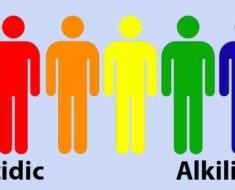
Do you ever wonder, “Why can’t I lose weight?” and all you hear back are crickets?
Well, sometimes, weight loss can be kind of a b*tch.
You’re doing everything right (or so you thought), starting to lose some weight, and then it just… stops.
It’s like that new relationship where things are going pretty smooth and then all of a sudden they send you to voicemail and stop returning your texts.
You were doing everything right, but it still wasn’t good enough.
What’s the deal?
Here’s the thing: it’s not you, but it is you.
Confusing, yes, but once you realize what’s stalling your weight loss journey, you’ll understand that it is you but that there’s something you can do about it.
Why Can’t I Lose Weight? 15 Reasons Why You’re Not Losing Weight
When it comes to weight loss, everything goes hand-in-hand and once you grasp the meaning behind it all, the weight will just melt off.
These are 15 common reasons why you’re not losing weight and what you can do about it!

1. You Don’t Understand How Weight Loss Occurs
The fact of the matter is, the majority of people don’t understand how weight loss actually occurs.
It’s not just eating salads and exercising – there’s a lot more to it.
Not knowing the reasoning behind a problem makes it difficult, if not impossible, to fix which is why so many people struggle to lose weight.
So the first step in answering, “Why aren’t I losing weight?” is learning why you’re actually overweight and what to do about it.
While there are other factors that can influence weight gain, such as underlying health issues, it all really comes down to caloric consumption.
By this, I mean how many calories you’re consuming versus how many calories you’re burning every day.
Your body is constantly burning calories for basic functions to keep you alive and well, whether you’re sitting on the couch or going for a jog.
Every person’s daily caloric needs are different from one another since they’re based on age, sex, body size and composition, and activity levels.
When you consistently exceed your daily caloric intake, you’re feeding your body more energy (calories) than it needs, so it has to do something with it.
All of those extra calories – whether they’re from carbohydrates, fat, or protein – end up being stored as fat
This means the more you overeat, the more fat your body stores.
Consistently overeating is what leads to weight gain.
So how do you lose weight?
You have to eat less than your daily caloric needs.
Consuming fewer calories than your body needs means it has to get the rest of it’s energy somewhere, and this somewhere is from stored body fat.
So in order to lose weight, you need to eat slightly less than you need in order to burn off that fat!
Pretty simple, right?
Related: How to Lose Weight Naturally: Tips & Tricks for Healthy Weight Loss
2. You’re Not Tracking Macros
Macronutrients, commonly referred to as macros, are nutrients required in large quantities that provide the body with the energy it needs.
Macros consist of carbohydrates, fat, and protein each with their own purpose in serving your health, as your body needs a certain percentage of each to function properly.
When you eat a balanced diet, you’re consuming a proper ratio of carbs to fat to protein based on what your body needs.
That’s why tracking macros is far more important and beneficial to your health and weight loss than just counting calories.
When you only count calories, you don’t know if you’re eating a balanced diet, and with all the processed foods we eat today, chances are you’re not.
If you only count calories, you could be getting 1200 out of 1600 calories from carbs alone, leaving only 400 calories for fat and protein (which is not nearly enough).
It’s for this reason you should be tracking macros and not calories.
3. You’re Not Eating Enough Protein
We live in a very carbohydrate-dependent society, so chances are that you’re not eating enough protein.
Protein is essential for muscle growth and repair and increases satiety, the feeling of being full, due to an increase in diet-induced thermogensis, one of three components of daily energy expenditure (1).
Ideally, you should get around 25% of your daily calories from protein.
A study conducted of the effects a high protein (HP) diet has on weight loss concluded that the HP diet (25%) resulted in a greater reduction of body weight & waist circumference than a diet consisting of only 15% protein (2).
If you’re struggling to get enough protein, then a protein powder might help you. I recommend Amazonia RAW Certified Organic Slim and Tone Protein powder.
4. You’re Eating Low-Quality Foods
With such a heavy reliance on processed foods today, it’s extremely likely you’re NOT eating a balanced meal.
Fast food and processed foods are very carbohydrate-heavy, as they contain heavily processed and refined grains and sugars.
Due to a lack of micronutrients and their simple nature, these foods are digested quickly and lead to spikes in blood sugar and insulin, as well as hunger shortly after.
Eating low quality foods makes it easy to eat far too many carbohydrates (and not the good kind) and not enough healthy fats and protein.
Foods high in protein will help keep you fuller for longer since they take longer to digest. The longer they take to digest, the longer you feel full and the less you’ll end up eating.
You should aim to eat a balanced diet full of whole foods, like fruits and vegetables, as well as healthy fats and protein to help keep you full for longer and therefore decrease your caloric consumption.
5. You Don’t Know the Difference Between Calorie Dense & Nutrient Dense Foods
Not all calories are created equal.
Calorie dense foods are processed, refined foods like chips, baked goods, and fast food that, as the name suggests, contain a lot of calories.
They don’t hold much nutritional value aside from simple, refined carbohydrates that are easily digested, giving you a quick burst of energy, then a crash and hunger shortly after.
On the other hand, nutrient-dense foods such as fruits, vegetables, healthy fats, and lean protein sources offer you a balanced meal that will leave you satisfied and full.
So you’re less likely to overeat throughout the day since you’re getting the proper macros your body needs without all the calories that come from processed foods.
6. You Think You Can Only Eat Salads
I have one word for you: wrong.
While salads can be a great way to get in micronutrients and healthy carbohydrates with few calories, they aren’t the end all be all when it comes to losing weight.
You can still eat pizza or a burger every now and then as long as you’re eating a balanced diet.
The key is to make sure you’re not overeating.
7. You Have The Wrong “Diet” Mindset
Many people think that a “diet” is a restrictive way of eating and see it as a short-term fix.
With it comes the mentality that if you eat something you’re “not to supposed to” then you’ve failed and you might as well give up.
I’m here to tell you that the only way to fail is to give up.
You should find a realistic way of approaching weight loss that’s sustainable for YOU, and that starts with your diet.
Stop thinking of a diet as restrictive and torturous and start thinking of it as what it is: a part of your lifestyle that encourages a sustainable way of eating.
This means focusing on eating healthy, whole foods about 80% of the time and indulgent foods (think pizza and ice cream) the other 20% of the time, within your daily caloric needs.
Don’t think of eating a burger as a “cheat meal” or “going off your diet.”
You’re not cheating. You’re not going off your diet.
You’re simply allowing yourself to eat something you’ve been craving without going overboard.
Changing your mindset when it comes to your diet can make a world of difference when it comes to the food choices you make and losing weight.
8. Your Plates Are Too Big & Your Portions Are Out of Control
You know the saying, “Your eyes are bigger than your stomach?”
Yeah, well this happens far too often when using large plates and bowls.
One of the simplest reasons you aren’t losing weight is because your dishes are too big so you’re grabbing too large of portions.
To solve this problem, get smaller dishes and watch your portions (yes, it’s really that simple!).
9. You’re Drinking Your Calories
This one will get ya.
Soda, juice, frappucinos, energy drinks, alcohol – they all contain empty calories, meaning they provide no nutritional value to you except calories.
They don’t help with hunger or satiety, they just taste good.
And they’re one of the easiest ways to rack up calories throughout the day and still feel hungry.
This is because they are all refined carbohydrates, like sugar and white flour, so they’re very easy for your body to digest.
The fast absorption and digestion cause a spike in blood sugar and insulin levels which has been linked to weight gain.
And they contain a ton of calories without contributing to satiety.
In addition, a study found that replacing water with sugar-sweetened beverages increases caloric consumption (3).
That means you’re also more likely to eat more when you drink something other than water.
So a word to the wise: ditch the calorie-dense drinks and stick to water.
10. You’re Not Drinking Enough Water
Our bodies are made up of between 55-65% water, as every organ (heart, lungs) contain and use water to function properly.
Since we rely so heavily on water for normal bodily functions, we need a constant supply to maintain good health.
And we need plenty of it.
Unfortunately, most people don’t drink enough water each day and it’s a shame because water is so important for a healthy mind and body.
One of the many important roles water plays in your health is aiding in weight loss.
Drinking water has been shown to increase the number of calories burned over a 1.5 hour period by 24-30% (4).
So just by drinking water, you can burn more calories than if you had not.
Another study found that people who drank half a liter (17 ounces) of water a half-hour before meals lost 44% more weight than those who did not (5).
Moral of the story is: drink your water!
11. You’re Stressed
When you’re stressed, your body produces high levels of the stress hormone called cortisol.
Cortisol is linked to an increase in appetite, junk food cravings, and weight gain.
Learning how to manage your stress can reduce cortisol levels and aid in weight loss.
Yoga, meditation and CBD oil are two great natural methods for relieving stress and I highly recommend both.
Related: 11-Minute Calming Yoga Flow for Stress and Anxiety Relief
12. Your Sleep is Sh*t
The amount and quality of your sleep is extremely important for both your physical and mental health.
It even plays a significant role in your weight.
One study found that poor sleep increases the risk of obesity in adults and children by 55% and 89%, respectively (6).
Getting good quality sleep is important for your overall well-being and can help you lose those stubborn pounds.
I recommend going to sleep earlier and trying natural sleep remedies such as yoga and CBD oil to improve the quality of your sleep.
13. You’re Doing TOO MUCH Cardio
Cardiovascular exercise also referred to as cardio and aerobic exercise, increases your heart rate and plays an important part in heart health.
However, too much can actually be a bit of a bad thing.
When you do too much cardio, your body produces an overwhelming amount of cortisol.
When you produce too much cortisol, your brain is instructed to store fat, especially around your abdomen.
In addition, high cortisol levels make it difficult for your body to process sugar which can also lead to weight gain.
So if you’re doing all the cardio and can’t seem to lose weight, this is why.
Instead, you should aim for shorter cardio sessions a few times a week and add in weight training as your main form of exercise.
Related: 10 HIIT Workouts for Fast & Effective Weight Loss
11 Powerful Yoga Poses for Weight Loss
14. You’re Not Weight Training
When it comes to exercise and weight loss, weight training has been proven to burn more body fat than cardio alone.
The main reason for this is that weight lifting can increase your metabolism for up to 38 hours after working out.
This means that if you normally burn 50 calories when sitting around watching TV, you’ll instead burn more.
Even if it’s only 5 more calories an hour, over the course of 38 hours it adds up!
In addition, weight training helps build muscle mass and muscle burns more calories than fat.
So the more muscle you have, the more energy is required to maintain them, so you’ll burn more calories and therefore more fat.
15. You Have an Underlying Health Issue
Sometimes, you can be doing everything right and still not lose any weight.
If you’ve tried everything on this list and still can’t seem to get past your weight loss plateau, you may need to see a doctor.
There may be an underlying health issue that’s to blame for your weight gain and inability to lose weight.
Now You Know What to Do
There’s a running theme here when it comes to why you’re not losing weight: calories run the show.
The only way to lose weight is to consume fewer calories than your body needs and focus on eating healthy, balanced meals the majority of the time.
Once your diet’s in check, make sure you’re managing your stress in a healthy fashion and are getting a good night’s rest.
And if that still doesn’t help, see your doctor to figure out what underlying health issues are to blame.
To get started on the keto diet, I highly recommend The Perfect Keto Starter Bundle from Perfect Keto, the perfect start to your keto journey and will help you active ketosis!






